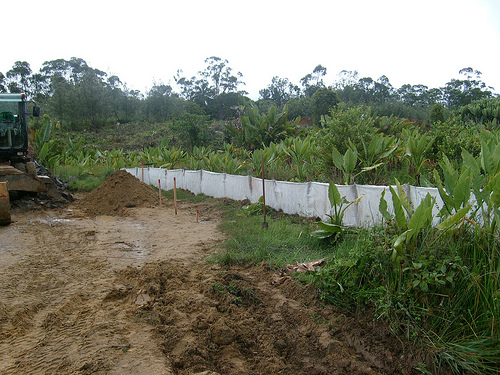Following national and international outrage, the land deal that would have let South Korean firm Daewoo Logistics lease a large swath of Madagascar's arable land, was finally rejected. The number of reported land deals between wealthy countries and developing nations, struck in an effort to prevent food shortages, continues to grow. Similar agreements are also allegedly in the works between United Arab Emirates and Sudan.

Photo of a site on the Tamatave-Tananarive road by foko_madagascar
The most recent putative deal reported in the Guardian and the Daily Nation has Kenya leasing out 40,000 hectares (about 100,000 acres) to Qatar. In exchange for the land, Qatar would fund construction of a new Sh2.4 billion port on Lamu island.
The deal drew the ire of Opalo, Kenyan blogger at Opalo's blog, who fears a new kind of colonialism is taking shape:
So what happens after we’ve parceled off most of Kenya to Qatar, China, India, UAE, the Saudis and just about anyone willing to pay the goons that we’ve entrusted with our political leadership? Are we gonna become squatters again? Are we gonna start being called “boy” again?
He adds:
“And where exactly are the Kenyan millionaires? Can’t they afford to invest in such ventures? What are they waiting for?”
Malagasy bloggers are still reeling from the Korean deal that almost was. SEFAFI, a Malagasy diaspora association in France, organized a think-tank to discuss best practice policies with respect to land management in Madagascar. On a Yahoo forum about Madagascar, SEFAFI posts an essay that revisits the failed deal and what can be learned from it (fr):
Les démentis officiels n’ont cependant pas levé toutes les
appréhensions. Vraies ou fausses informations, des leçons doivent être
tirées de l’affaire Daewoo. La première leçon à en tirer est, une fois
de plus, le manque de transparence pour des opérations qui engagent les
ressources naturelles du pays. La prétendue gratuité du bail de 99 ans
ou même une éventuelle contrepartie sous forme d’infrastructures ne fait
qu’aviver les soupçons d’existence de contreparties secrètes au profit
d’intérêts particuliers et au détriment de la collectivité nationale.
SEFAFI sees a problem that is beyond economics or means of production. SEFAFI points out that the 70% of the population in Madagascar live in the rural area. Because farmers are fiercely attached to their way of life, they are reluctant to utilize mass means of production and such blockbuster deals neglect to take into consideration the true interests of the farmers. The article advocates for a progressive reform (fr):
Si l’objectif est bien de donner à l’ensemble du monde rural les moyens de gérer son propre avenir, les opérations ponctuelles de fermes pilotes ou d’élevages modèles, gérées par des groupes étrangers soucieux des paysans malgaches et donc respectueux d’une véritable démarche sociétale, seront les bienvenues. Sans empiéter sur les terres des paysans ni aliéner le patrimoine national, elles pourraient devenir un facteur d’entraînement et préfigurer ainsi l’agriculture malgache de demain
On the same yahoo forum, Gazety Nosintsika quotes an article from the newspaper Le Monde that cites a report by Olivier De Schutter, Special Investigator to the UN for the Rights to Food, on globalization, trade and its impact on the food shortage. The report points out that the current situation is quite precarious for agriculture in the developing world because the dependence on exports is gradually increasing (fr):
On leur a promis qu'avec les devises ainsi engrangées, ils pourraient importer de quoi nourrir leur population pour un prix inférieur à ce qu'ils auraient pu produire eux-mêmes. Problème : on a engendré leur dépendance par rapport à des indices boursiers de plus en plus volatils. Après une baisse des cours de leurs produits, ils ne peuvent plus payer leurs importations, dont la valeur a, elle, été parfois multipliée par cinq ou six.
Finally, Taru Taylor reacting from South Korea to the Daewoo Deal has a unique take on the land deal:
Although not contemporaries like Jefferson and Hamilton, Choe Cheu and Park Chung-hee are the grand interlocutors of Korean destiny. Tonghak is one portal; imperialism is the other. The “Republic of Korea” and “Imperial Korea” are the terms of the debate between the agrarian hero and the capitalist dictator. The beef protests argue for Choe Cheu; for Tonghak; for Korea as Luke Skywalker, Jedi Knight. But the Madagascar deal argues for Park Chung-hee; for Imperial Korea; for Korea as Anakin Skywalker nee Sith Lord Darth Vader.







10 comments
I had only heard the deal had gone through, I just now learned that it failed. I agree importing mass Agribusiness to Madagascar would not be beneficial to the citizens. It would displace many more than it employed.
Thanks,
Matt
If this kind of project will be realized here in Madagascar it will be a sad situation because we will be like those african countries which suffer in their own land, they work hard for something which does not belong to them.
That will make Malagasy people poorer and poorer.
Great news Lova!!! Blogging efforts started to payoff, now is the time to step up pressure and end the deal once and for all.
This article says the deal was put on hold because of media pressure…
http://www.telegraph.co.uk/news/worldnews/africaandindianocean/madagascar/4240955/Land-rental-deal-collapses-after-backlash-against-colonialism.html